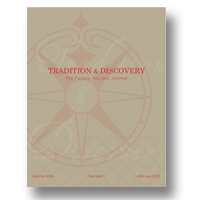|
journal and society information |
|
1.
|
Tradition and Discovery: The Polanyi Society Periodical:
Volume >
43 >
Issue: 3
Editorial Board and Submissions Guide
view |
rights & permissions
| cited by
|
|
|
|
|
|
|
2.
|
Tradition and Discovery: The Polanyi Society Periodical:
Volume >
43 >
Issue: 3
Paul Lewis
Preface
view |
rights & permissions
| cited by
|
|
|
|
|
journal and society information |
|
3.
|
Tradition and Discovery: The Polanyi Society Periodical:
Volume >
43 >
Issue: 3
Notes on Contributors
view |
rights & permissions
| cited by
|
|
|
|
|
engagements with retrieving realism by herbert dreyfus and charles taylor |
|
4.
|
Tradition and Discovery: The Polanyi Society Periodical:
Volume >
43 >
Issue: 3
John V. Apczynski
A Polanyian Epistemology Manqué:
Reflections on Retrieving Realism
abstract |
view |
rights & permissions
| cited by
These reflections attempt to clarify and strengthen Dreyfus and Taylor’s defense of a realist understanding of knowing by comparing it to features of Michael Polanyi’s theory of personal knowledge. I believe this overcomes some ambiguities such as their use of “mediation” and strengthens their case in discussing science without recourse to the notion of a “view from nowhere.” These in turn provide a more robust understanding of their understanding of realism within a pluralist framework. For students of Polanyi’s thought, this comparative effort provides an opportunity to place Polanyi’s theory within the wider world of contemporary philosophical thinking that they bring to their exposition of a “contact” theory of knowing. This might provide a basis for developing Polanyi’s thought through these contemporary channels.
|
|
|
|
|
5.
|
Tradition and Discovery: The Polanyi Society Periodical:
Volume >
43 >
Issue: 3
Esther L. Meek
Contact with Reality:
Comparing Michael Polanyi and Dreyfus and Taylor, Retrieving Realism
abstract |
view |
rights & permissions
| cited by
This essay contrasts Michael Polanyi’s insight regarding contact with reality to the idea of direct contact theory that Hubert Dreyfus and Charles Taylor develop in their recent effort to “retrieve” realism. Whereas the latter locates a “direct” contact “beneath” articulation in a preconceptual layer “accessible only by phenomenology,” Polanyi locates contact in discovery—not beneath, but rather beyond, our efforts to know. It is also apparent that the authors of Retrieving Realism presume an epistemology less sophisticated than Polanyi’s subsidiary-focal integration, as well as omitting the critical epistemic component of commitment. The essay concludes that Polanyi offers the superior challenge to “the picture that held us captive”—Cartesian epistemology with its resultant anti-realism, one which additionally unleashes a lively, surprising real to its proper primacy.
|
|
|
|
|
6.
|
Tradition and Discovery: The Polanyi Society Periodical:
Volume >
43 >
Issue: 3
David W. Rutledge
Dreyfus, Taylor, and Polanyi’s Prescience
abstract |
view |
rights & permissions
| cited by
Hubert Dreyfus and Charles Taylor argue explicit conceptual knowledge has an essential pre-conceptual “background” fully embedding the knower in the world. This refutes the Cartesian view that knowledge of the outside world is mediated through the mind of the observer. This “mediational” view is undermined by Kant, Heidegger, Merleau-Ponty, Wittgenstein, and Todes, and the “contact theory” they make possible. I add Polanyi to the list, as tacit knowing accomplishes similar things in better fashion.
|
|
|
|
|
7.
|
Tradition and Discovery: The Polanyi Society Periodical:
Volume >
43 >
Issue: 3
Charles Lowney
Robust Moral Realism: Pluralist or Emergent?
abstract |
view |
rights & permissions
| cited by
In Retrieving Realism, Taylor and Dreyfus aim to correct mistaken modern assumptions and their post-modern reactions in order to affirm a robust realism about a world for scientific and moral exploration. Their critiques and solutions have much in common with Polanyi’s approach; they all emphasize tacit body-knowing, background frameworks, and our ability to develop epistemological structures that better and better grasp the world considered independent from us. Dreyfus-Taylor and Polanyi diverge, however, when it comes to choosing a framework from which to understand a robust moral realism. The former endorse a Heideggerian “reveal but conceal” pluralist approach, while a Polanyian view advocates a “progress but with risk” emergentist approach. I argue that the emergentist approach provides a better defense against deflationary realism and better reconciles apparent contradictions, such as physical causality and free will, engaged contact and progress in knowing reality in-itself, and cultural relativism and objective morality. While a pluralist account may have the strength of endorsing tolerance, it is more vulnerable to an ethical relativism; and while an emergentist view is more clearly at risk of illicit dogmatism, it has the strength of endorsing the search for moral truth that we all can share.
|
|
|
|
|
book reviews |
|
8.
|
Tradition and Discovery: The Polanyi Society Periodical:
Volume >
43 >
Issue: 3
Andrew Grosso
The Language Animal: the Full Shape of the Human Linguistic Capacity
view |
rights & permissions
| cited by
|
|
|
|
|
9.
|
Tradition and Discovery: The Polanyi Society Periodical:
Volume >
43 >
Issue: 3
Dale Cannon
To Flourish or Destruct: A Personalist Theory of Human Goods and Motivation
view |
rights & permissions
| cited by
|
|
|
|





